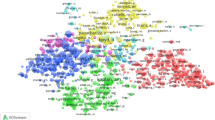Abstract
Several studies have been written that provided extensive details on various areas and historical stages of US public diplomacy in the Middle East (Vaughan in: The failure of American and British Propaganda in the Arab Middle East, Palgrave Macmillan, New York, 2005; Rugh in: American encounters with Arabs: the” soft power” of US public diplomacy in the Middle East, Greenwood Publishing Group, New York, 2006, in: Front line public diplomacy: How US Embassies Communicate with Foreign Publics, Palgrave Macmillan, Hampshire, 2014, Cull in: The Cold War and the United States Information Agency: American Propaganda and Public Diplomacy, 1945–1989, Cambridge University Press, Cambridge, 2008, in: CPD Perspect Public Dipl 2:19, 2009, in: The Decline and Fall of the United States Information Agency: American Public Diplomacy, 1989–2001, Palgrave Macmillan, London, 2012, Seib in: Toward a new public diplomacy, Palgrave Macmillan, Hampshire, 2009; Seib in: Real-time diplomacy: politics and power in the social media era, Palgrave Macmillan, Hampshire, 2012). After offering a brief survey of the different developments in American public diplomacy efforts in the Middle East, this paper focuses on the US Department of State’s Digital Outreach Team (DOT) and presents an analysis of the social media outlets run by DOT. The paper concludes that the overwhelming responses are negative in nature and suggests that DOT has not achieved its intended goals because a more focused approach is needed.
Similar content being viewed by others
Notes
A news item on the activities of the American Library in Waziriyah in Baghdad was published in a daily Iraqi newspaper in January 1967. The news article mentions the following: “The schedule of the American Library for January includes showing films inside the Library on the following topics: city planning—teaching physics—American archeological sites—US law- machinery and equipment—the American military academy—satellites—rockets—helicopter—radio inventor. Exhibition times: 11:00 A.M. every Friday. Dr. Richard Frye, Professor of Middle Eastern History at Harvard University, is going to visit Iraq from 13 to 20 January 1967. He will deliver some lectures. Friday 20 January 1967—7:00 PM. A lecture at the American Library Hall on the famous American novelist, William Faulkner, delivered by Guy Farrington, a lecturer at the Higher Institute of Languages. Public attendance”.
A DOT Facebook post attacking ISIS reads as follows: “Hunger, fear, poverty, unemployment are the reality of life under Deash [ISIS].” First image of the right says: “False propaganda,” while second image states: “Reality.” Retrieved from (https://www.facebook.com/DigitalOutreachTeam/photos/a.10150323285850637.569156.139958610636/10156399164890637/?type=3&theater).
Some of the other anti-terrorist campaigns that were sponsored or supported by the US Department of State included ‘Think Again Turn Away’ and ‘Sawab’ (Unite States Department of State 2015b; Global Engagement Center 2016). In relation to the latter campaign, Richard Stengel mentioned that it was launched against ISIS because the “coalition does not communicate well internally and externally” (United States Department of State 2015a, p. 1), while the former campaign released a video called “Welcome to the ‘Islamic State’ land” in English which became popular in 2014 with about 897,138 views as of August 31, 2016 (Global Engagement Center 2014). However, the Arabic version that was posted by DOT did not receive the same audience attention, and the two Arabic and English video versions were later removed from YouTube because they did not seem to create the intended impact.
References
Al Arabiya. 2008. Arab Americans. Accessed from http://www.alarabiya.net/views/2008/06/12/51387.html.
Al-Rawi, Ahmed K. 2012. ‘Campaign of Truth Program’: US propaganda in Iraq during the early 1950s. In Religion and the Cold War: A global perspective, ed. Philip Muehlenbeck, 113–138. Tennessee: Vanderbilt University Press.
Boyd, D.A. 1999. Broadcasting in the Arab world: A survey of the electronic media in the Middle East. Iowa City: Iowa State University Press.
Brown, Hayes. 2014. Meet the State Department team trying to troll ISIS into oblivion. Think Progress. Accessed from https://thinkprogress.org/meet-the-state-department-team-trying-to-troll-isis-into-oblivion-3927b7c6492#.v5kr0lhn3.
Bryman, A., and R.G. Burgess (eds.). 1994. Analyzing qualitative data. London: Routledge.
Corbin, J.M., and A. Strauss. 1990. Grounded theory research: Procedures, canons, and evaluative criteria. Qualitative sociology 13 (1): 3–21.
Cottee, Simon. 2015.Why It’s So Hard to Stop ISIS Propaganda. The Atlantic. Accessed from http://www.theatlantic.com/international/archive/2015/03/why-its-so-hard-to-stop-isis-propaganda/386216/.
Cull, N.J. 2008. The Cold War and the United States Information Agency: American Propaganda and Public Diplomacy, 1945-1989. Cambridge: Cambridge University Press.
Cull, N.J. 2009. Public diplomacy: Lessons from the past. CPD Perspectives on Public diplomacy 2: 19.
Cull, N.J. 2012. The Decline and Fall of the United States Information Agency: American Public Diplomacy, 1989–2001. London: Palgrave Macmillan.
Dewey, Caitlin. 2013. The State Department’s Arabic outreach team spoofed an al-Qaeda video. Accessed from https://www.washingtonpost.com/news/worldviews/wp/2013/07/09/the-state-departments-arabic-outreach-team-spoofed-an-al-qaeda-video/.
Dizard, W.P. 2004. Inventing public diplomacy: The story of the US Information Agency. New York: Lynne Rienner Publishers.
DOT. 2007. What you don’t know about 9/11 attacks. Accessed from https://www.youtube.com/watch?v=S01RaG9mGLc.
DOT. n.d.. About. Accessed from https://www.youtube.com/user/StateDepartment/about.
Dutta-Bergman, M.J. 2006. US public diplomacy in the Middle East a critical cultural approach. Journal of Communication Inquiry 30 (2): 102–124.
El-Nawawy, Mohammed. 2006. US public diplomacy in the Arab World: The news credibility of radio Sawa and Television Alhurra in five countries. Global Media and Communication 2 (2): 183–203.
Ezell, D. 2012. Beyond Cairo: US engagement with the Muslim world. Hampshire: Palgrave Macmillan.
Global Engagement Center. 2014. Welcome to the ‘Islamic State’ land. Accessed from https://www.youtube.com/watch?v=-wmdEFvsY0E.
Global Engagement Center. 2016. YouTube. Accessed from https://www.youtube.com/channel/UCUjopo5TdYn5qGC5QmbkpcQ.
Khamis, S. 2011. The transformative Egyptian media landscape: Changes, challenges and comparative perspectives. International Journal of Communication 5: 19.
Khatib, L., Dutton, W., and Thelwall, M. 2011. Public diplomacy 2.0: an exploratory case study of the US digital outreach team. Khatib, L., Dutton, WH, and Thelwall, M.’Public Diplomacy, 2.
Kruckeberg, D., and M. Vujnovic. 2005. Public relations, not propaganda, for US public diplomacy in a post-9/11 world: Challenges and opportunities. Journal of Communication Management 9 (4): 296–304.
Lahlali, E.M. 2011. Contemporary Arab broadcast media. Edinburgh: Edinburgh University Press.
Middle East Quarterly. 2008. Daniel Nassif: “We Do Not Spread Propaganda for the United States”. J Ecol 15 (2): 63–69.
Miller, G., and S. Higham. 2015. In a propaganda war against ISIS, the US tried to play by the enemy’s rules. Washington Post. https://doi.org/10.1080/15295036.2017.1393097.
Office of Inspector General. 2008. Alhurra’s Programming Policies and Procedures. ISP-IB-08-45, May. United States Department of State United States Department of State and the Broadcasting Board of Governors. Accessed from https://oig.state.gov/system/files/106057.pdf.
Osgood, Kenneth. 2006. Total cold war: Eisenhower’s secret propaganda battle at home and abroad. Lawrence: University of Kansas.
Revise, Nicholas. 2014. The US has launched a Social Media offensive Against ISIS. AFP. Accessed from http://www.businessinsider.com/afp-us-cyber-warriors-battling-islamic-state-on-twitter-2014-8.
Rugh, W.A. 2004. Arab mass media: Newspapers, radio, and television in Arab politics. New York: Greenwood Publishing Group.
Rugh, W. 2006. American encounters with Arabs: The” soft power” of US public diplomacy in the Middle East. New York: Greenwood Publishing Group.
Rugh, W. 2014. Front line public diplomacy: How US embassies communicate with foreign publics. Hampshire: Palgrave Macmillan.
Schmitt, E. 2015. U.S. Intensifies Effort to Blunt ISIS’ Message. The New York Times. Accessed from http://www.nytimes.com/2015/02/17/world/middleeast/us-intensifies-effort-to-blunt-isis-message.html?_r=0.
Seib, P. (ed.). 2009. Toward a new public diplomacy. Hampshire: Palgrave Macmillan.
Seib, P. 2012. Real-time diplomacy: Politics and power in the social media era. Hampshire: Palgrave Macmillan.
Stevenson, R. L. 1974. Audience segmentation: An approach to international communications. The Annual Meeting of the Association for Education in Journalism 57th, San Diego, August 18–21.
Thelwall, M. 2009. Introduction to webometrics: Quantitative web research for the social sciences. San Rafael, CA: Morgan & Claypool.
United States Department of State. 2015a. (SBU) Paris Visit. Sensitive but unclassified. Note for the Secretary. June 9. 201508510. Accessed from https://assets.documentcloud.org/documents/2101556/diplo.pdf.
United States Department of State. 2015b. Launch of the Sawab Center. Office of the Spokesperson, Washington D.C. July 8. Accessed from http://www.state.gov/r/pa/prs/ps/2015/07/244709.htm.
U.S. Central Intelligence Agency. 1950. “National Intelligence Survey- Iraq, Section 43, Religion, Education, and Public Information,” FOIA Electronic Reading Room. Accessed from https://www.cia.gov/library/readingroom/docs/DOC_0001252339.pdf.
U.S. Department of State. 2011. Center for Strategic Counterterrorism Communications. Accessed from http://www.state.gov/documents/organization/116709.pdf.
Vaughan, J.R. 2005. The Failure of American and British Propaganda in the Arab Middle East, 1945–1957. New York: Palgrave Macmillan.
Vine. 2014. Digital Outreach Team. Accessed from https://vine.co/v/O1D3dEFrgWK.
Vitalis, Robert. 2000. American ambassador in technicolor and cinemascope: Hollywood and revolution on the Nile. In Mass mediations: New approaches to popular culture in the Middle East and Beyond, ed. W. Armbrust. California: University of California Press.
Wang, J. 2007. Telling the American story to the world: The purpose of US public diplomacy in historical perspective. Public Relations Review 33 (1): 21–30.
Wikileaks. 2006. Digital Outreach to Oman. December 13. From Muscat, Oman to Secretary of State. Accessed from http://wikileaks.cabledrum.net/cable/2006/12/06MUSCAT1684.html.
Author information
Authors and Affiliations
Corresponding author
Additional information
Publisher's Note
Springer Nature remains neutral with regard to jurisdictional claims in published maps and institutional affiliations.
Electronic supplementary material
Below is the link to the electronic supplementary material.
Rights and permissions
About this article
Cite this article
Al-Rawi, A. US public diplomacy in the Middle East and the Digital Outreach Team. Place Brand Public Dipl 16, 18–24 (2020). https://doi.org/10.1057/s41254-019-00122-w
Revised:
Published:
Issue Date:
DOI: https://doi.org/10.1057/s41254-019-00122-w




